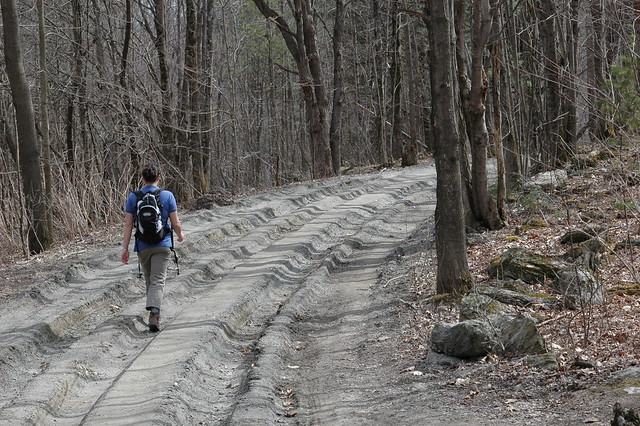One of the expressions that came up in the French conversation group yesterday was (être) coincé dans une ornière, which means (to be) stuck in a rut.
Coincé [kwɛ̃.se] means stuck, jammed,wedged, stranded, uptight, stuck up or close-minded. It appears in expressions like:
- etre coincé = to be stuck (fast), to get stuck
- etre coincé dans = to be marooned in
- etre coincé entre = to be wedged between
- etre coincé avec qn = to be stuck with sb
- etre coincé avec qch = to be stuck with sth
- rester coincé = to get stuck
- La clé est coincée dans la serrure = The key is stuck in the lock
- La porte est coincée = The door’s jammed
- Il est un peu coincé = He’s a bit uptight
It comes from coincer (to jam, catch (out), nab, stick), which comes from coin (wedge, cornerpiece, corner, area, part, place, spot), from the Old French coin, from the Latin cuneus (wedge, wedge shape, troops in a wedge formation, an army), from the Proto-Indo-European *h₂ḱū (sting), which is also the root of such words as the English coin and cuneiform, the Irish cúinne (angle, corner, nook), the Welsh cŷn (chisel) and the Albanian kunj (peg, spike).
Ornière [ɔʁ.njɛʁ] is a rut, habit, routine or cart track, and appears in such expressions as;
- suivre l’ornière = to be in a rut
- sortir de l’ornière = to get out of a rut / spot
- dans l’ornière = in a rut
- dans une ornière = cornered
- avec ornière = potholed
It comes from the Old French ordiere, from the Vulgar Latin *orbitaria, from the Latin orbita (a track or rut made by a wheel, path, track, circuit, orbit, impression, mark), form orbis (rind, circle, orbit).
Another way to say you’re stuck in a rut in French is s’encroûter, to get into a rut, to get set in one’s ways, to become encrusted (“to encrust onself”).
Sources: Reverso, Wiktionary


